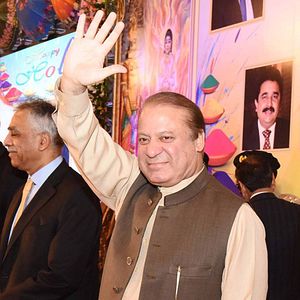Pakistan’s former Prime Minister Nawaz Sharif has once again been elected the head of his political party, the Pakistan Muslim League-Nawaz. Sharif was forced to resign from the party’s leadership after the country’s top court found him guilty in the Panama Papers corruption scandal.
A week ago, Sharif’s political party, which is also in power at the federal level, passed an amendment to the constitution that paved the way for his return to the party’s top spot.
While Sharif has vowed to strengthen the role of civilian institutions in the country, for many, his return to politics is only meant to rescue his dwindling political dynasty, which is being challenged in a number of ways. However, the important question remains: how does Sharif plan to rescue this political dynasty when the core circle of his political organization is being isolated through a sustained accountability drive?
To begin, one of the key constitutional advantages that Sharif possesses exists in the form of his party’s massive presence in the parliament. Sharif’s political organization can easily pass or amend any law that it may perceive as threatening to the party’s political future. The country is less than a year away from its next general election and it’s likely that Sharif’s party will use its strong position in parliament to fend off challenges, such as those pertaining to the ongoing accountability drive.
For Sharif’s party, the issue related to the Panama Papers accountability drive, which has been underway for the last year, is no longer concerned with tackling corruption in its holistic form in the country. Sharif and the inner circle of his party believe that the so-called accountability drive is politically motivated and is being maneuvered by other state institutions, particularly the military establishment, to weaken Pakistan Muslim League-Nawaz’s political support base.
In Pakistan, one commonly comes across the argument that other state institutions, such as the military establishment, have been influential in maneuvering the courts’ decisions against the Sharif family. While it’s debatable whether the military has had any role in the recent accountability drive, which appears to be targeting Sharif’s family, what has become certain now is that Sharif has blatantly attempted to build a narrative that circles around the so-called historic subjugation of the civilian leadership by the country’s courts and the military establishment. It’s unlikely that Sharif is going to win against the country’s courts and the military establishment by creating a popular narrative that offers legitimacy to his argument of “victimhood.”
It appears that Sharif is willing to take the risk of using his political strength in Punjab and his presence in parliament to bring his party back to power in the next general elections. However, it remains to be seen that how far Sharif is willing to go in terms of using his party’s constitutional strength to change more laws that may create a roadblock in the coming weeks and months. Sharif and his advisors are going to be mindful of the fact that any further constitutional push, aimed at isolating the courts and other institutions, will generate a mass opposition in the country.
So far, Sharif has successfully kept his role relevant in the country’s policies. However, going forward, his party is likely to face more scrutiny through court trials and other institutions of accountability, for Sharif’s whole narrative of victimhood is being built at the expense of these institutions. Sharif has continually targeted the country’s courts by calling them institutions that are serving the agenda of non-civilian forces. It’s a matter of time before the courts strike back by terming the recent amendment to the law that brought Sharif back to politics ineffective. Moreover, the cases that are still pending in the National Accountability Bureau (NAB) against Sharif and his children are not likely to go away unless Sharif introduces another controversial constitutional amendment that takes away all powers of the judiciary, prompting a crisis.
Sharif has effectively created a situation where institutional collision in the country appears likely. It’s clear that he is bent on staying in power even if that comes at the expense of democracy and institution-building in the country.






























